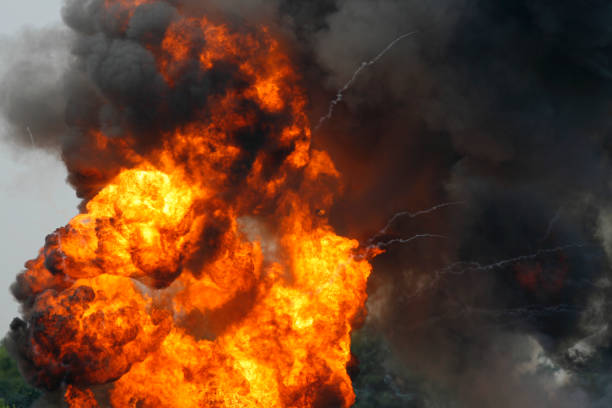An explosion suspected to be caused by an Improvised Explosive Device (IED) has left seven schoolchildren injured at LGEA Primary School, Ater, located in the Ukum Local Government Area of Benue State. The incident has sent ripples of concern across the community and sparked wider conversations about school safety and unexploded ordinances in Nigeria and other parts of West Africa.
Local sources indicate that the unfortunate event unfolded when a group of pupils came across a strange object inside one of the classrooms. Unaware of its danger, the children reportedly started to play with it. The object, later suspected to be an IED or component from past security operations in the area, detonated, injuring several pupils.
According to eyewitnesses and community members, the device may have been inadvertently left behind during previous clearance operations by security forces operating in Benue, a state often affected by communal tensions and security interventions.
The names of the injured children, spanning various age groups, have been provided by school authorities and local officials. They include Abigail Terseer (Primary Five), William Msaaga and Tyolumun Deborah (both Primary Six), Terseer Mhenuter (Primary Three), Mzungwega Mnengeuter (Primary Two), and Aondohemba Luper (Primary One). Each child’s age reflects the broad vulnerability of students in the region, underscoring the urgent need for comprehensive safety assessments in all educational environments.
DSP Udeme Edet, the Public Relations Officer for the Benue State Police Command, confirmed the incident and reported that an Explosive Ordnance Disposal (EOD) unit was immediately dispatched to the scene. The EOD team’s main priority was to secure the area, ensure the safety of other pupils and staff, and conduct a thorough investigation into the cause and source of the explosive. “Our officers are on ground, and a detailed evaluation will follow to prevent any further risks,” Edet stated to local media on Friday.
The gravity of the situation attracted top officials from the Benue State Ministry of Education and Knowledge Management, led by Commissioner Dr. Margaret Adamu. Dr. Adamu and her delegation visited the school for an on-site assessment before proceeding to St. Anthony’s Hospital in Zaki-Biam, where the wounded pupils were receiving medical care. She used the opportunity to commend both the local government and hospital staff, highlighting their prompt response: “The swift interventions from Ukum Local Government Chairman, Jonathan Modi, and the staff at St. Anthony’s Hospital were crucial in stabilising the children,” Dr. Adamu noted. She further expressed optimism for the children’s full recovery.
Chairman Modi, although away from the area on official business at the time of the incident, provided updates on the children’s conditions. According to his account, three of the injured children were close to being discharged after medical observation, while one child suffering from serious eye trauma was set to be referred to a specialized facility in Makurdi for further treatment. Modi praised the courage of both the school teachers and medical staff involved in the immediate aftermath, stressing the government’s commitment to improving school safety going forward.
The Director of St. Anthony’s Hospital, Rev. Sister Susan Tonguve, also assured families and stakeholders that all injured students had been stabilized. She stated, “Out of the seven, only one requires long-term eye care; the rest are responding well to treatment and will be discharged soon.” Her assurances have helped to calm some of the anxiety in the community, though broader concerns about safety remain.
Community members, grappling with the aftermath, have begun to voice their gratitude and hopes. Mzungwega Yongo, speaking for the parents of affected children, thanked the Benue State authorities for their rapid response, aid to families, and commitment to ongoing support amid difficult circumstances.
In multiple interviews, local residents shed more light on the sequence of events. One resident, identified as Ternenger, explained the incident occurred when the children picked up an unfamiliar object and, out of curiosity, inserted it into a combustible element—a dangerous act that triggered the explosion. According to Ternenger, “It was not an armed attack targeted at the school, but purely an accident. No lives were lost, but seven pupils sustained injuries and the blast damaged part of the school building.” Both residents and parents repeatedly emphasized the need for more rigorous safety checks in areas where prior military or security activity may have taken place.
Benue State, like other regions in Nigeria’s North Central zone, has seen periodic security operations due to clashes, banditry, and communal violence. Sadly, the legacy of such actions sometimes includes unexploded ordinances left behind, posing ongoing threats to civilians. According to a survey by the Mines Advisory Group, unexploded remnants of war have resulted in hundreds of casualties across West Africa in the past decade, with children disproportionately affected due to their lack of awareness and natural curiosity.
In comparison, countries facing similar security challenges have ramped up efforts on post-conflict ordnance clearance. For instance, the United Nations Mine Action Service (UNMAS) collaborates with local authorities in Mali, Nigeria, and Chad to clear schools and communities of unexploded devices, while also supporting education campaigns to teach children how to recognize and avoid dangerous objects.
Legal analysts and education experts recommend regular safety inspections in all schools previously occupied by military or security forces. National guidelines from Nigeria’s National Emergency Management Agency (NEMA) require schools to report any suspicious items and for teachers to undergo basic safety training. However, the implementation of these measures, especially in rural and conflict-affected areas, is often inconsistent due to resource constraints.
This tragic event has reignited the call for stronger collaboration between state governments, local councils, and security agencies to proactively address the dangers that may linger after security operations. Many experts suggest long-term solutions could include:
- Comprehensive sweeping and certification of school grounds following military activities
- Community-wide awareness campaigns about the dangers of unexploded ordinances
- Integrating child-focused safety and emergency preparedness into the school curriculum
- Establishing rapid-response units comprising both security personnel and health professionals
While investigations into this particular incident continue, the Benue government has pledged to support affected families and strengthen preventive measures. Parents, activists, and education stakeholders across the West African subregion hope this painful episode will serve as a wake-up call for comprehensive action.
Incidents like this reflect wider issues faced by many African nations recovering from conflict or insecurity. The international community, including organizations such as UNICEF and the African Union, has consistently advocated for the protection of children and schools in all contexts, emphasizing the need for continual vigilance.
As the community of Ater and the wider Benue State await the outcome of investigations and support for the victims, this event is a somber reminder that children’s safety must be a top priority—both locally and globally.
What can communities, government agencies, and international partners do to prevent similar tragedies in the future? What are your thoughts on ensuring school safety in areas affected by past conflict? Drop your opinions in the comments and don’t forget to follow us for continuous updates.
Do you have important news to share or a unique story to tell? We want to hear from you! Send your tips or stories to story@nowahalazone.com for a chance to get featured or sell your story.
For general support, reach us at support@nowahalazone.com. Stay connected for breaking news and community updates—follow us on Facebook, X (Twitter), and Instagram!









